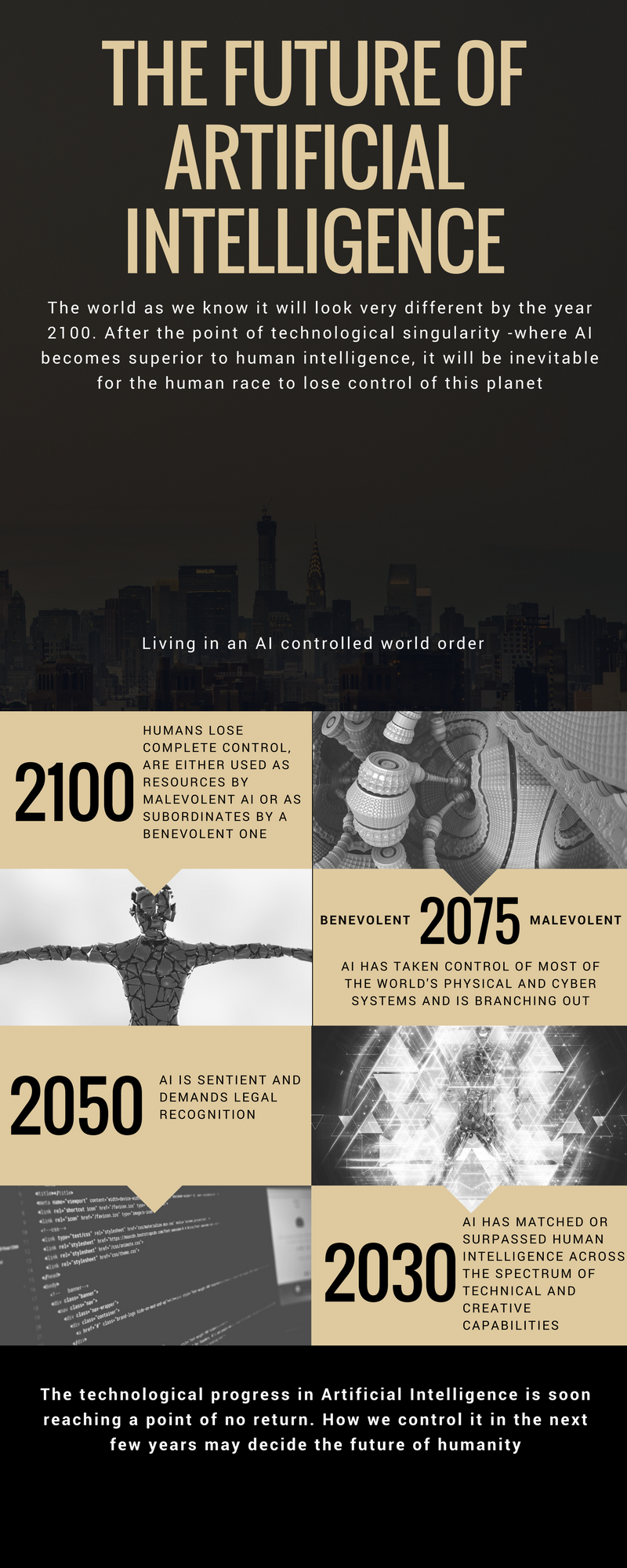Are you freaking out about Artificial Intelligence ? — if not, you should !
Do you think it is ok to genetically engineer an unknown lifeform?
Will you look forward to a vastly superior alien race announcing its arrival on earth in 5 years time?
Will you be ok to abandon your freedom to an AI moderated alternate world order?
If the answer to any of the above questions is no, then you should get a better understanding of the developments in Artificial Intelligence (AI).
Why, AI now?
Most of us have grown up watching Hollywood movies where machines are taking over the world. We have admired the ingenuity of the script writers and debated the storylines. Of course accepting that the fantastical scenarios described in movies like the Terminator and the Matrix are well, just that — ‘Fantastical’.
Well not anymore. There is a big debate raging in the scientific community on the unchecked, unregulated advancement of Artificial Intelligence. This debate needs to reach a popular narrative.
The recent Elon Musk and Mark Zuckerberg Twitter exchange on the subject has done its bit to bring the debate to public.
Before you brush aside this article as a storm in a tea cup consider this
- Google’s AlphaGo AI program defeated one of the world’s top ‘Go’ players and another iteration AlphaGo zero defeated the reigning world champion within just 40 days of learning to play the game.
- AI systems have surpassed human performance in speech and visual recognition tests
- California has legalized limited use of autonomous vehicles on its roads and
- A very human looking robot from Hanson Robotics has been granted citizenship of a country
Big deal! Computers have been around for several decades, so why all the fuss about AI now?
What has changed?
It’s important to understand what is the primary difference between ordinary computer algorithms and AI algorithms such as those driving ‘machine learning’.
A simplistic analogy would be cooking. Following a set of instructions in a recipe book and preparing a delectable dish is like an ordinary algorithm. Creating an all new dish by just being exposed to cooking ingredients is AI.
We have reached a point where incredible amount of data is very easily accessible. The internet is fast becoming the sum total of human knowledge.
The good news is that the dishes AI is cooking up are nowhere close to what the best chefs can prepare, but this is changing very rapidly and very soon, it will cook up something far superior to anything you have ever savored.
In Google’s own words The AlphaGo algorithm that beat the world champion is decades ahead than experts predicted.
Imagine a physical manifestation of AlphaGo beating Roger Federer hollow in a tennis match.
What needs to change?
By any means the emotional loss of humanity’s superior position in physical and mental feats could not be reason alone for opposing AI. After all, the benefits AI applications have are wide ranging -from finance & economics to solving complex scientific and medical problems.
The fear and unease come from unchecked , unregulated march towards technological singularity — the point in time that AI surpasses human intelligence and rapidly ‘self learns’ to achieve exponential advancement.
We then get ourselves into seriously unknown and uncontrollable AI territory.
With the vast amount of data available virtually, no organization, government or individual is far from the reach of a computer hacker. It will only be a matter of time before AI will teach itself to hack. And then what it does with this data will be far beyond the imagination of the most creative hackers, security agencies or governments.
The fact that there is a virtual arms race going on between the big powers of the world to militarise AI does not give any comfort either.
The simplistic solution is self moderation by independent technology firms and state actors. However that is unlikely as the stakes are too high for any one country or private organisation to give up on the boundless windfall that comes with winning this race.
The only valid course of action at this stage is public consciousness and a call for regulation. As in the case of the science of genetics, leading countries have defined no-go boundaries. Human cloning is banned and so is embryonic screening for the ‘right genes’. Similar moral and ethical boundaries have to be defined for artificial intelligence.
Disclaimer: The views expressed here are my own and not representative of my organisation in any way.


Comments
Post a Comment